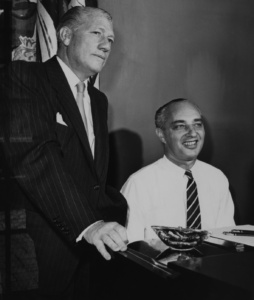Stories of Standards: “You and the Night and the Music”
 Tune in weekday mornings for Stories of Standards to hear our favorite versions of “You and the Night and the Music.” Rodney Franks presentsStories of Standards Monday through Friday at 7:50 and 8:50 a.m.!
Tune in weekday mornings for Stories of Standards to hear our favorite versions of “You and the Night and the Music.” Rodney Franks presentsStories of Standards Monday through Friday at 7:50 and 8:50 a.m.!
Stories of Standards is sponsored by ListenUp.
“You and the Night and the Music” was written for the 1934 musical “Revenge with Music”, based on the Spanish folk tale “El Sombrero des Tres Picos” (“The Three-Cornered Hat”), with music by Arthur Schwartz and book and lyrics by Howard Dietz. The storyline is of a provincial governor (played by Charles Winninger), who attempts to seduce a miller’s wife (played by Libby Holman). The miller (played by Georges Metaxa) then seduces the governor’s wife (played by Ilka Chase). Two songs from this play became hits, “You and the Night and the Music” and “If There is Someone Lovelier Than You”.
Arthur Schwartz (Nov 25, 1900 – Sep 3, 1984) taught himself piano and harmonica as a child. His father, an attorney, required that he attend law school, which he did, passing the bar in 1924. He had, however, been publishing songs while in school and was encouraged to compose by his friends George Gershwin and Larry Hart. After practicing law for four years, Schwartz’s first collaboration with Howard Dietz was on 1928’s “The Little Show”. In 1930 they wrote “Something to Remember You By” for “Three’s a Crowd” and in 1931 had the hit “Dancing in the Dark” in “The Bandwagon”. While “Revenge with Music” did not do well on Broadway, there were two hit songs. Schwartz then turned to Hollywood, where he wrote for movies and was nominated twice for Oscars. He then started producing films before returning to Broadway in 1948. In 1953 he and Howard Dietz made a film adaptation of “The Bandwagon”, which was nominated for best score and included the song “That’s Entertainment!”.
Howard Dietz (Sep 8, 1896 – July 30, 1983) attended Columbia College, then Columbia University. He served as publicist and director of advertising, first for Goldwyn Pictures, then for MGM, where he created Leo the Lion and chose the slogan “Ars Gratia Artis” (“Art for art’s sake”). Dietz served in the US Navy in WWI and was editor of their magazine “Navy Life”. During WWII he helped publicize and promote War Bonds and created stage shows for the Coast Guard with composer/lyricist Vernon Duke. Dietz was director of ASCAP from 1959 to 1961 and wrote his autobiography “Dancing in the Dark” in 1974.
Both Schwartz and Dietz were inducted into the Songwriters Hall of Fame in 1972.
Become a Member
Join the growing family of people who believe that music is essential to our community. Your donation supports the work we do, the programs you count on, and the events you enjoy.
Download the App
Download KUVO's FREE app today! The KUVO Public Radio App allows you to take KUVO's music and news with you anywhere, anytime!